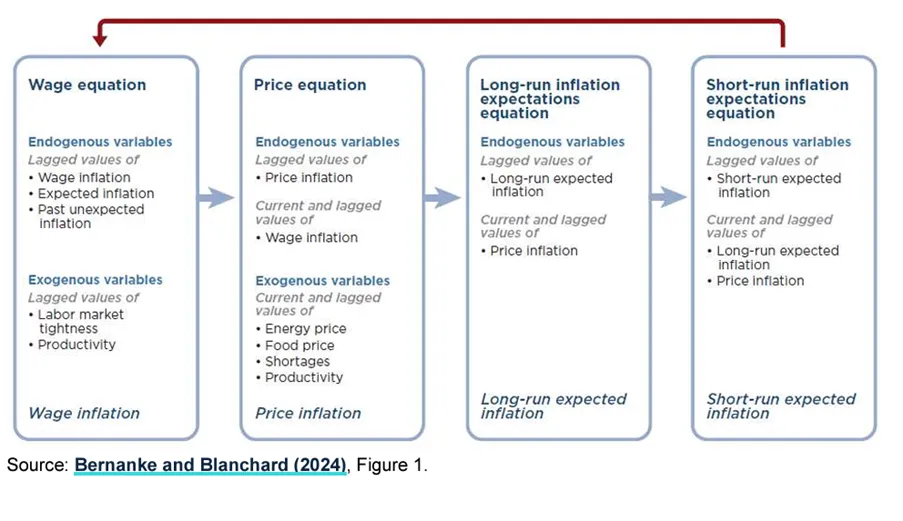The upward burst of inflation in the 1970s and post-pandemic were caused by broadly the same factors: massive, unexpected rises in imported commodity prices. But the post-peak trajectories were very different: inflation was much more persistent in the 1970s, due to unanchored price expectations and inflexible labour markets, than it has been so far for the recent inflation. The lesson of this comparison is, in my view, that Central Bank credibility is an incredibly valuable (intangible) asset.
Jonathan Haskel (Bank of England)
12 July 2024
“UK inflation: What's done and what's to come?”
Speech by Jonathan Haskel (Bank of England) at King’s College London

The Economic Statistics Centre of Excellence (ESCoE) hosted a speech from Jonathan Haskel in his final weeks as an external member of the Bank of England’s Monetary Policy Committee. ESCoE is a collaboration with the Office for National Statistics, hosted by King’s College London.
The event was chaired by Rebecca Riley, ESCoE Director and Professor of Practice in Economics at King’s Business School.
Using a newly constructed dataset, Jonathan contrasted our current experience to that of the 1970s. Looking ahead, he reflected on the challenges of making policy in real-time, the importance of economic measurement to good decision-making and the outlook for wage growth and inflation.
What caused the pandemic-era inflation spike in the UK? And why was the 1970s so different?
Jonathan’s talk built on a previous speech and accompanying paper from 2023 to explain the recent inflation spike in the UK using the Bernanke-Blanchard (2023) model.

Jonathan updated those estimates with 2024 data and extended the model. Firstly, he estimated the model for periods since the late 1960s up to the present, using data available from ESCoE’s historic repository. He then estimated the model over three 30-year windows, and contrasted the results, to explore the changes in the inflation process over time.
The challenges of policy making in real time
Jonathan showed the challenges of policy making in real-time, using the Labour Force Survey (LFS) as a case study.
The suspension of the LFS-based unemployment estimates in late 2023, and their subsequent reintroduction, led to important revisions to unemployment. Jonathan demonstrated how the revisions to data between February 2024 and March 2024 interest rate setting meetings contributed to a different interpretation of the relationship between vacancies and unemployment and impacted policymaking. This case study reinforces the importance of official data and economic measurement for policy making.
Economic measurement is central to good decision-making.
Jonathan Haskel (Bank of England)
The outlook for inflation
On the future inflation outlook, Jonathan said there are considerable encouraging signs. However, he highlighted the impact of enormous shocks on the wage-price system in the UK in recent years. He emphasised the interaction of a tight labour market and second-round effects as previous inflation works its way through the wage-price system.
The playing out of those shocks through the economy, and the continued tight and impaired labour market, means that inflation will remain above target for quite some time. I would rather hold rates until there is more certainty that underlying inflationary pressures have subsided sustainably.
Jonathan Haskel (Bank of England)
About the Economic Statistics Centre of Excellence
The Economic Statistics Centre of Excellence (ESCoE) brings a research-led approach to measuring the economy. Established in 2017 with the support of the UK Office for National Statistics (ONS), ESCoE is a hub of world-leading expertise, supporting cultural change in the delivery of economic statistics.
ESCoE will also host the General Conference of the International Association for Research in Income and Wealth (IARIW) at King’s Business School on 26 to 30 August 2024. Find out more.
About Jonathan Haskel
Jonathan Haskel CBE is Professor of Economics at Imperial College Business School and an external member of the Bank of England’s Monetary Policy Committee. His research is on productivity and intangible investment and he is the co-author of two books: ‘Capitalism without Capital: The Rise of the Intangible Economy’ and ‘Restarting the Future: How to Fix the Intangible Economy’. He has been a non-executive director of the UK Statistics Authority and panel member of the Competition and Markets Authority.
